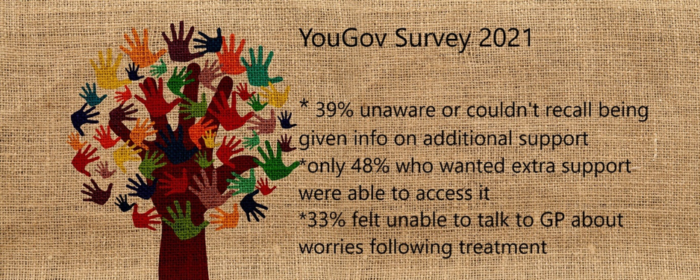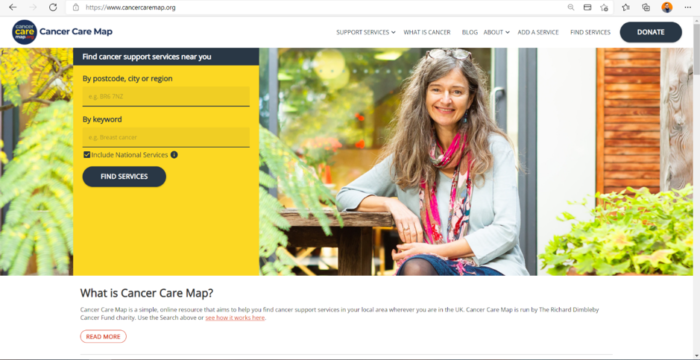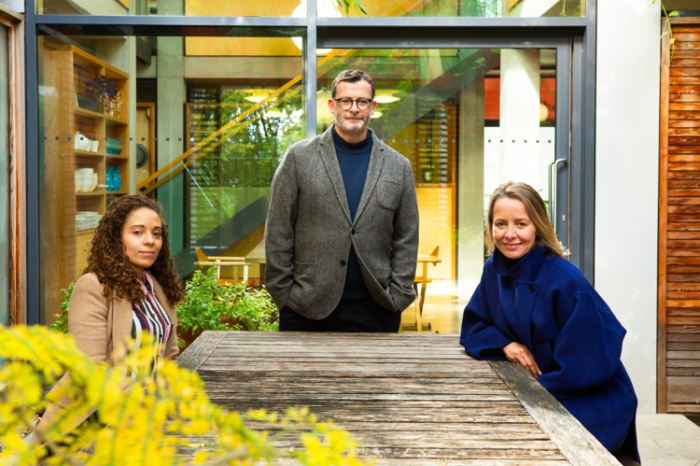
It’s been four years since the pilot launch of www.cancercaremap.org in 2018. A lot has happened in that time, not only to the delivery of cancer care, but to the world as we know it, and support services in the UK have found new ways to adapt to the world we now find ourselves in.
Co-director, Robin Pritchard explains how the project came about and their future plans.
At the end of last year, we commissioned a piece of research through YouGov, talking specifically to people who had had cancer or were undergoing treatment:
- Over a third of those surveyed (39%) either weren’t aware of or can’t recall being told about additional help available such as counselling, financial support and transport services
- Only half of those surveyed (48%) who felt that they needed additional support after their diagnosis were often able to access help when they needed it.
- A third of those surveyed (33%) don’t feel able to talk to their GP about worries and concerns after finishing their cancer treatment
Jonathan Dimbleby, Chair of The Richard Dimbleby Cancer Fund, recently appeared on BBC Breakfast to help raise awareness of Cancer Care Map. He said, “When you are diagnosed with cancer it is a moment of extreme anxiety. After you’ve had your clinical treatment you almost always need support for weeks, months and even years ahead. This can take many forms: emotional, practical and financial. The sole purpose Cancer Care Map, which is supported by the NHS, is to provide the information you need to help you through this testing journey. Our research shows that many, many people are missing out on this kind of support. Cancer Care Map allows anyone to find out what is available to them close to where they live. All it takes is the click of a button.”

The original idea for Cancer Care Map came from Jonathan. Our work at the time was focussed predominantly on the Dimbleby Cancer Care services at Guy’s Cancer Centre, but we were always asked by people how they could find out about what support services were available near them. We commissioned some research to look into this with Guy’s and St Thomas’, and also begin to map services in the wider local area. What we found was that there was no comprehensive central place to go to find out about cancer care in the UK. There are directories of support services for specific tumour groups or run by other charities to signpost their own services, but we couldn’t find anything that showed you everything that was available to you solely focussed on cancer support. And if you went to ‘Google’ it was hard to know where to start, or if the information you came across was up to date or was giving safe, trusted advice. So that’s where Cancer Care Map came from: we wanted to create a comprehensive, free to access, trusted directory of cancer care services in the UK – not just the well-known information centres like Maggie’s and Macmillan, both of whom we now work closely with, but all the amazing community and smaller charity-led organisations operating all around the country, providing care and support not just to those diagnosed with cancer but also the families and carers supporting them.
We carried out a series of workshops with patients, carers and GPs to find out what they wanted and launched the pilot site in 2018. We then went live with the full site three years ago on #WorldCancerDay 2019.
The biggest impact on cancer care and the cancer community in that time has of course been COVID-19 – not only the virus itself but the knock-on effects of isolation and delayed cancer treatments. When the first lockdown happened in March 2020, many cancer support centres had to close their doors. That meant all the face-to-face support that is so important to people living with cancer suddenly stopped. People who were going through treatment had to shield and isolate. To many people going through treatment or living with cancer, the information centres and counselling sessions and support groups are their lifelines. Cancer didn’t go away, and all those feelings of anxiety and isolation were only heightened by the pandemic. So organisations very quickly adapted what they were doing. All the many helplines and online support services already out there really came into their own, and other services moved their support to reach people virtually through phone calls, Zoom and video calls, chatrooms and even virtual exercise and group classes.
It’s meant that many cancer care organisations can now connect with people further afield than their local area. Organisations have worked incredibly hard to keep services running, opening centres for face-to-face support when they could to those most in need, and ensuring that those isolating at home still felt connected. And people have really embraced online and virtual support like never before. Social media often gets bad press, but there are some wonderful online communities out there helping people through really difficult times. Cancer Care Map has been able to bring all this information together to connect people with the kind of support they may not have even realised it out there.

As things have begun to open up again it’s been so good to see support centres opening up and face to face support able to happen again. But many of the new ways of connecting with people virtually will continue. It’s a new way of reaching people and supporting them when they need it most. We also don’t know how things will go over the coming weeks and months, and many – especially those vulnerable due to their treatment – will decide to continue to stay home to shield themselves.
When we first launched the site, we had 150 organisations on the map. Today we have over 3,000 and are adding more each week. We are working with NHS healthcare trusts across the country to ensure we have all the services in their local area on the map. All information is checked and verified before adding, and then once something is listed on Cancer Care Map, we make sure it is updated regularly – and with services adapting their support as lockdown rules have changed over the last year, this is really important. At the moment we are able to ensure everything is checked every 2-3 months.
We’ve been lucky enough to have been able to work right the way through since March 2020. We’re a small core team of three and began working from home straight away. As we’ve secured more funding over the last 12 months, we were able to expand the team and last year began working with additional content editors.

Robin Pritchard and the CancerCareMap team
We also worked with a digital company called AND Digital who developed a brand-new version of the site for us which launched in March 2021. They did all the work pro bono, despite the challenges of the last two year, and without their support we never would have been able to do it. Our aim is to continue to grow Cancer Care Map and ensure that anyone in the UK affected by cancer knows that we are here to help them find the support they need.
And so, when you have a patient in front of you, whether they are living with cancer themselves or are supporting someone who is, by pointing them in the direction of Cancer Care Map you can be confident that they will find help they can trust, information that is up to date, and hopefully support that they (and perhaps you) didn’t even know was available to them.”
Cancer Care Map [LINK TO https://www.cancercaremap.org/} is a stand-alone, comprehensive, independent, free to use online directory of cancer support services in the UK providing verified and trusted information, regularly checked and updated and accessible to all.
- Find information on support for families, loved ones and carers as well as those living with cancer themselves
- Cancer Care Map is collaborating with organisations across the UK including charities, NHS services, private practice and support groups
- All information is checked and verified by our team
- Listings are updated every 2-3 months currently to ensure details are correct
- Find psychological and emotional support, health and wellbeing services, and practical help wherever you are in the UK
- There are over 3,000 organisations listed on Cancer Care Map
- Over 10,000 people are accessing the site each month currently
Follow us on Twitter and Instagram @CancerCareMap and find us on Facebook.com/CancerCareMap